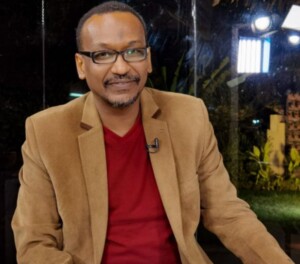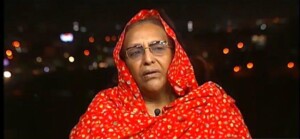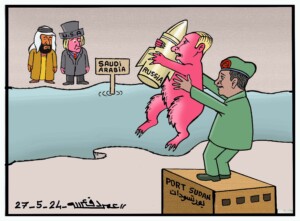Darfur rebel SLM-AW denies claims that it will join Sudan peace talks
According to the South Sudanese team preparing peace talks, Abdelwahid El Nur, head of the holdout Sudan Liberation Front (SLM-AW) in Darfur, has agreed to join peace talks with the Sudanese government, after years of rejecting a dialogue with Khartoum. The group itself denied the news.
 Abdelwahid El Nur, head of the holdout SLM-AW rebel faction (File photo)
Abdelwahid El Nur, head of the holdout SLM-AW rebel faction (File photo)
According to the South Sudanese team preparing peace talks, Abdelwahid El Nur, head of the holdout Sudan Liberation Front (SLM-AW) in Darfur, has agreed to join peace talks with the Sudanese government, after years of rejecting a dialogue with Khartoum. The group itself denied the news.
According to the South Sudanese team mediating peace talks between the two main holdout rebel groups under the leadership Abdelwahid El Nur in Darfur and Abdelaziz El Hilu in South Kordofan, El Nur has agreed to join peace talks with the Sudanese government, after years of rejecting a dialogue with Khartoum.
The head of the South Sudanese mediation team, Tut Galuak, announced the readiness of the SLM-AW to negotiate on Thursday. He said he is awaiting news on a date for the arrival of its leader in the South Sudanese capital Juba, after which the Sudanese government will be formally invited to start negotiations with the holdout group.
He made the announcement in a press conference following his meeting with visiting Sovereign Council member, Lt Gen Shamseldin Kabashi.
‘False statements’
However, the SLM-AW said that its delegation has not agreed to join the Juba negotiations yet, in a statement on Friday.
The delegation, led by its Vice President Abdallah Harran, "is visiting Juba at the invitation of South Sudan Salva Kiir, to discuss the movement’s vision about achieving peace in Sudan and how it can be supported."
The movement’s spokesperson, Mohamed El Nayer, accused Galuak of making false statements. “He is not a spokesman nor a member of the SLM, so how can he say such statements that have nothing to do with the truth? The SLM on all its levels has had no contact with the head of the South Sudanese mediation team since the start of the Juba negotiations [in September 2019],” he said.
So far, El Nur has stuck to his position that he will only join negotiations after security and stability have been realised in Sudan’s conflict-torn western region.
Reports of insecurity and attacks on civilians, especially displaced persons, continue to proliferate in Darfur. Most recently, Radio Dabanga reported that five people were injured and at least six others went missing in an attack on a village in El Kuma, North Darfur, last week.
The statement further referred to El Nur’s proposal to organise “a Sudanese-Sudanese dialogue within the country, with the participation of all political, civil, popular and military components that address the historical roots of the crises and agree on a non-partisan civilian government.”
The SLM-AW pledged to release the details of its peace initiative after the end of the COVID-19 pandemic.
SPLM-N El Hilu
Galuak also said that the other hold-out rebel group, the Sudan People’s Liberation Movement-North led by Abdelaziz El Hilu (SPLM-N El Hilu) in South Kordofan and parts of Blue Nile state, is ready to reach a peace agreement with the government during the press conference on Thursday, .
The negotiation team of the rebel group is currently in Juba, hoping they will soon reach an understanding about the proposals it forwarded to the Sudanese government in October.
The SPLM-N El Hilu entered the peace negotiations in Juba last year separately. Its long-standing position is to establish a viable secular Sudan that prevents imposing laws on a religious basis, and the right to self-determination for southern Sudan.
Implementation goes ahead
According to Galuak, the mediation team will travel to Khartoum today to discuss the progress of implementation of the Juba Peace Agreement signed by the government and the Sudan Revolutionary Front rebel alliance on October 3 last year.
In the same press conference on Thursday in Juba, Kabashi described the eastern Sudan track protocol in the Peace Agreement as “comprehensive”, and should not be frozen or suspended. He affirmed that the Sudanese government will definitely implement the eastern Sudan track protocol which forms part of the Juba Peace Agreement.
Radio Dabanga’s editorial independence means that we can continue to provide factual updates about political developments to Sudanese and international actors, educate people about how to avoid outbreaks of infectious diseases, and provide a window to the world for those in all corners of Sudan. Support Radio Dabanga for as little as €2.50, the equivalent of a cup of coffee.












 and then
and then